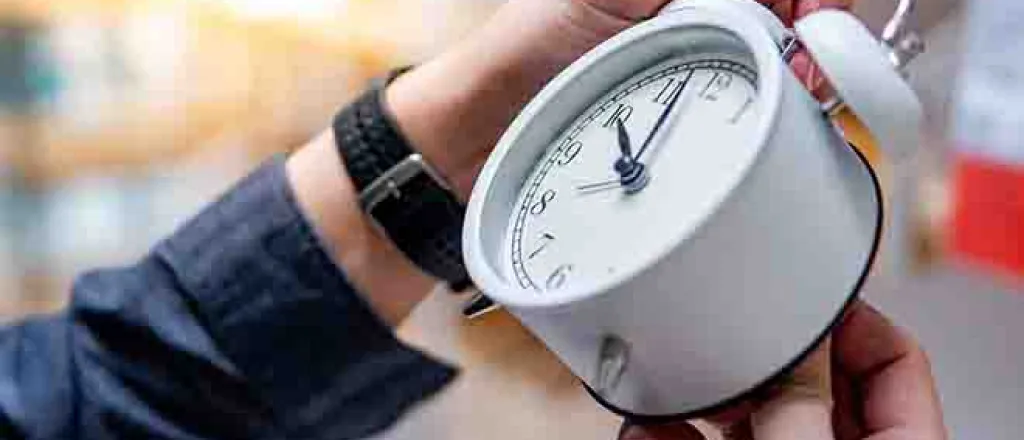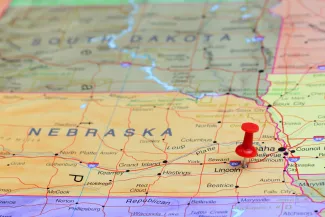
Lawmakers advance competing bills to end Nebraska’s twice-yearly clock changing
The full Nebraska Legislature again signaled majority support Thursday for ending the twice-a-year practice of changing the clocks.
However, nearly 30 state senators chose to advance both bills before the Legislature this year that would do so differently, delaying a final decision on whether permanent daylight saving time or permanent standard time should be the path forward for the Cornhusker State.
Most lawmakers said they could be swayed in either direction.
Economics, health lead conversation
Legislative Bill 34, from State Senator Megan Hunt of Omaha, advanced 29-13 to establish year-round daylight saving time. That’s the period between March and November when much of the country “springs forward” one hour and offers later sunsets in the summer.
LB 302, from State Senator Dave Murman of Glenvil, advanced 28-9 for year-round standard time. That’s the current position of clocks after “falling back” one hour for earlier sunrises in the winter.

Hunt led the charge on permanent daylight saving time from an economics position, arguing it could be better for parents to attend children’s games later at night in the sun, play golf and go to restaurants or shops.
“It’s a better thing for the economy,” Hunt said. “It’s a better thing for things like seasonal depression and just kind of the winter blues that you get when you don’t have any sunlight.”
Murman and State Senator Kathleen Kauth of the Millard area led the charge on permanent standard time from a health standpoint. Murman said it offered “superior benefits” that have been endorsed by major medical organizations.
Kauth pointed to many of those medical societies, including the American Academy of Sleep Medicine, American Medical Association, Nebraska Medical Association and British Sleep Society.
She said Murman’s bill is best to end a “tug of war” between biological and alarm clocks.
“Daylight saving time increases the risk to our physical health, mental well-being and public safety,” Kauth said. “Permanent standard time is the optimal choice for health and safety.”
Next steps to enact laws
Both bills would not go into effect until other surrounding states adopt similar laws:
- For Hunt’s bill, three adjacent states to Nebraska would need to adopt a single year-round standard of time.
- For Murman’s bill, Iowa, Kansas, South Dakota and Wyoming would all need to adopt legislation for year-round standard time. Some senators have said the list should include Colorado, to prevent a “time-zone island” in southwest Nebraska.
Federal law currently prohibits year-round daylight saving time but does allow year-round standard time, which Hawaii and Arizona (excluding the Navajo Nation) observe.
President Donald Trump has voiced support for ending the twice-a-year clock changing.
Of Nebraska’s neighboring states:
- Colorado and Wyoming have already adopted year-round daylight saving time, and Iowa is considering the same, like Hunt’s LB 34.
- South Dakota and Kansas are considering year-round standard time, like Murman’s LB 302.
- Missouri, like Nebraska, is considering either approach.
Hunt and Murman found common ground in wanting to end the clock-changing practice, which research indicates leads to increases in seizures, heart attacks, strokes, car accidents and workplace injuries shortly after each twice-yearly change.
A family divided
State Senator John Cavanaugh of Omaha, one of 19 senators to advance both bills, said Hunt’s bill might be good for recreation, but he also pointed to his children complaining about going to sleep in the summer while the sun is out and that an earlier sunset could allow fireworks sooner.
He said it’s nice to wake up in the morning alongside the sun, in standard time, to make breakfast for his children, which “makes the morning more pleasant.”
“When we make a decision, we are saying what time it is going to be, which is a huge responsibility,” Cavanaugh said.
In a light-hearted moment of the debate, his older sister, State Senator Machaela Cavanaugh of Omaha, joked that her brother needed to be “more responsible” about expanded fireworks use.
“I genuinely hate fireworks,” she said. “I know that makes me a killjoy, possibly unpatriotic, but I hate fireworks, and therefore I cannot in good conscience support a bill that would enable extra hours of fireworks.”
State Senator Myron Dorn of Adams, first elected alongside Hunt and Murman in 2018, said his wife told him after he won that she didn’t care what he did up in Lincoln or what he passed, except one issue: “Pass something about not changing the clocks,” he recounted.
Agriculture, Huskers championship
Freshman State Senator Tanya Storer of Whitman was among those who praised the issue for being nonpartisan and widespread, not limited to urban-rural splits.
She ultimately supported permanent standard time, from Murman, from an agricultural perspective. Storer represents 11 counties in north-central Nebraska where she noted some farmers wait to put out hay or begin harvesting until the sun is out.

© iStock - IMNATURE
Permanent standard time, she said, could also be better for students who are waiting on the bus in the winter, sometimes over an hour in rural parts of the state.
“I just think we have to be aware of what life looks like for our kiddos in terms of just getting on the bus, returning from schools and trying to provide a natural setting in hours of daylight during those hours for them as well,” Storer said.
State Senator Dunixi Guereca of Omaha noted later permanent daylight saving time might help the Nebraska Huskers football team bring back a national championship with later practices.
State Senator Rick Holdcroft of Bellevue, a retired U.S. Navy officer, said he is no stranger to time changes while slowly transiting the Pacific Ocean, with clocks changing about once every three days.
“I think we’re fine the way we are,” Holdcroft, one of four senators to oppose both bills, said.
A change of heart
Hunt, who had originally said this year she’d be fine with ending the clock change through either her bill or the approach from Murman, told her colleagues she had changed her mind.
She told her colleagues if they didn’t want permanent daylight time to leave the twice-a-year clock change in place.
“At least the status quo, at least how it is right now, when we have these dark, depressing winters, we can at least look forward to the late nights in the summer when we have sunshine, we can sit on our patios,” Hunt said. “If we take that away, I don’t know what I’m going to do.”
How lawmakers voted during the first round of 2025 debate on changing clocks
- Advance BOTH permanent daylight saving AND standard time (19): Bob Andersen, John Arch, Christy Armendariz, John Cavanaugh, Danielle Conrad, Wendy DeBoer, Barry DeKay, George Dungan, Bob Hallstrom, Teresa Ibach, Mike Jacobson, Loren Lippincott, Jason Prokop, Jane Raybould, Merv Riepe, Victor Rountree, Rita Sanders, Ashlei Spivey, Dave Wordekemper
- OPPOSE both bills (4): Carolyn Bosn, Rob Clements, Rob Dover, Rick Holdcroft
- Advance ONLY permanent DAYLIGHT SAVING time (10): Beau Ballard, Stan Clouse, Myron Dorn, John Fredrickson, Jana Hughes, Megan Hunt, Margo Juarez, Dan Quick, Tony Sorrentino, Paul Strommen
- Advance ONLY permanent STANDARD time (9): Tom Brandt, Ben Hansen, Kathleen Kauth, Dan McKeon, Glen Meyer, Mike Moser, Dave Murman, Jared Storm, Tanya Storer
- DID NOT VOTE on both bills (7): Eliot Bostar, Machaela Cavanaugh, Dunixi Guereca, Brian Hardin, Dan Lonowski, Terrell McKinney, Brad von Gillern

















